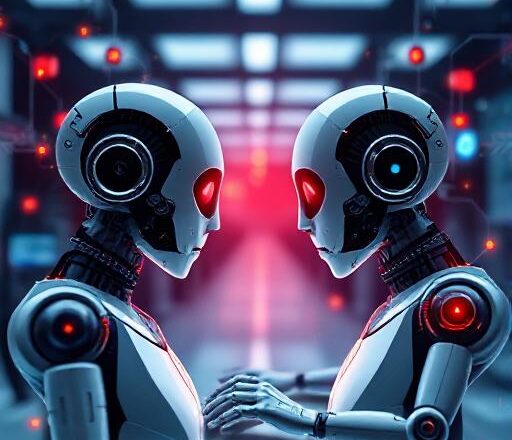Introduction
In 2025, the workplace is no longer just humans and computers—it’s humans, computers, and autonomous AI agents working side by side. These AI-driven digital co-workers don’t just respond to prompts like chatbots; they act independently, making decisions, executing tasks, and coordinating with both humans and other AI systems.
This new frontier of work is redefining productivity, sparking ethical debates, and raising the question: How much of our jobs will AI take over—and how much will it enhance?
1. What Are Autonomous AI Agents?
Unlike traditional AI tools that require constant human input, autonomous agents:
-
Set their own goals within defined parameters.
-
Plan and execute tasks using reasoning engines.
-
Adapt based on feedback and results.
-
Collaborate with humans and other agents in digital ecosystems.
Think of them as junior employees—ones who never sleep, never take breaks, and can juggle multiple projects at once.
2. Key Industries Already Using AI Agents
By mid-2025, autonomous AI agents are spreading across multiple sectors:
-
Finance: Running risk models, executing trades, and flagging fraud.
-
Healthcare: Assisting in diagnostics, managing patient data, and scheduling.
-
Retail: Handling inventory optimization and personalized recommendations.
-
Media & Marketing: Generating targeted ad campaigns and trend analysis.
-
Software Development: Auto-writing, testing, and deploying code.
In many cases, these agents are doing the “digital grunt work,” freeing humans for higher-level strategy.
3. The Tools Powering Autonomous Agents
Several platforms have become central to the rise of AI agents in 2025:
-
AutoGPT & BabyAGI Evolutions: Now refined into enterprise-ready tools.
-
LangChain & CrewAI frameworks: Powering AI reasoning and collaboration.
-
Custom AI clouds (Microsoft, Google, AWS): Offering ready-to-deploy agent ecosystems.
Some companies are even building “AI departments” where dozens of agents handle customer support, R&D, and logistics—reporting only to a handful of human supervisors.
4. The Productivity Boom
Studies in 2025 show early adopters of AI agents see:
-
30–40% faster project turnaround times.
-
Significant cost savings in administrative and analytical tasks.
-
Fewer errors in repetitive or data-heavy processes.
For small startups, hiring AI co-workers has leveled the playing field, letting them compete against giants with minimal staff.
5. Risks and Ethical Dilemmas
But the rise of AI co-workers also comes with growing pains:
-
Job displacement: Entry-level roles in finance, admin, and support are shrinking.
-
Bias and fairness: Agents inherit flaws from their training data.
-
Autonomy vs. accountability: Who’s responsible if an AI agent makes a costly mistake?
-
Security concerns: Malicious actors could deploy AI agents for scams or cyberattacks.
Governments are scrambling to update labor and liability laws to catch up with this new reality.
6. Human + AI = The Hybrid Workforce
Experts argue the future is not about replacing humans but augmenting them. In practice, that means:
-
AI handles routine, repetitive, or data-heavy tasks.
-
Humans focus on creativity, emotional intelligence, and big-picture strategy.
-
Workflows become human-AI collaborations rather than replacements.
In fact, some companies have reported higher employee satisfaction, as workers are freed from mundane tasks to pursue more meaningful projects.
7. Looking Ahead: The AI Colleague of 2030
By the end of the decade, we may see:
-
Fully autonomous AI departments running entire business functions.
-
AI managers overseeing human teams.
-
Personal AI agents for every professional, acting as career coaches, assistants, and negotiators.
But whether this future is utopia or dystopia depends on how businesses, governments, and workers adapt to this shift.
Conclusion
In 2025, autonomous AI agents are no longer experiments—they’re co-workers. From startups to Fortune 500s, companies are leaning on digital employees to handle complex tasks, generate insights, and boost productivity.
The rise of AI colleagues isn’t just about efficiency; it’s about redefining what it means to “go to work.” Humanity is entering an era where some of our closest collaborators may not be people at all—but lines of code.
